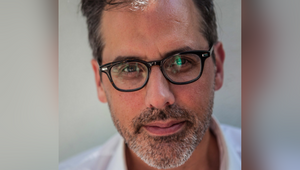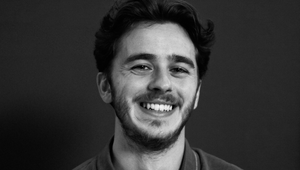
Shouting: Does It Get Shit Done?

Cavemen shouted because they were trying to scare whatever dinosaur they were in mortal combat with or they shouted because they were crapping their pants running away from a dinosaur. In the first instance, the caveman shouted in order to try and display greater power and make the dinosaur crap its pants (making it an easier kill). The other reason the caveman shouted was to cover the terrible fear that if they didn’t shout, they might start to cry in front of the dinosaur, thus losing their power allowing the dinosaur to step forward and devour the cowardly unshouty caveman.
As you can tell, I’m no Richard Dawkins but the genius of my ’Shout Paradigm’TM is that it can be easily adapted to our modern creative workplace. Just replace the word 'caveman' with Christian Bale and ‘dinosaur' with director of photography. And if you don’t know that reference, replace ‘caveman' with actor and ‘dinosaur' with director, or ‘caveman' with creative director and 'dinosaur' with client. It’s an endless game that keeps on giving. Go back and read it aloud now, it’s fun.
Shouting is power play. Daniel Bergmann, founder and president of Stink, says: “People with more power shout at people with less power.” But what does shouting say about us, is it effective in the modern workplace, is it appropriate and can it get shit done?
For full disclosure, I’m a comedy director. I’m a prime candidate to be a shouter but I’m not. I have shouted in the past but I’m not known to be a shouter. We’ve probably all shouted at some point in frustration and anger but we can probably excuse it; fatigue, heat, hunger, wrong side of bed. Some people are known shouters though, or at least have gained notoriety for having big, blow up, shouty episodes (Christian Bale, David O. Russell, all stills photographers).
Let’s start with what shouting says about us. Forgetting anything to do with shouting to be heard above noise, shouting tells people we are not happy. Perhaps we’re not happy with ourselves or perhaps we’re not happy with the person we’re shouting at. Clinical psychologist Paula Ravets, PhD believes that “shouting is used to intimidate people who ultimately fear they won’t be obeyed. She says shouting is a form of bullying.” We all know bullies are cowards, and cowards project their own insecurities, projecting insecurities triggers fears which in turn becomes anger which transmogrifies into shouting. Simple.
When I listened again to the famous Christian Bale explosion, where the director of photography adjusts a light during a take, or David O. Russell blowing a fuse at Lily Tomlin on the set of I Heart Huckabee, because she couldn’t perform a certain action with her feet on the table, there were two lines that jumped out at me. Mr Bale shouted: “For fuck’s sake man, you’re an amateur.” And Mr Russell screamed: “Act like a grown up, I’m here to fucking help you!” Both drip with delicious irony. Mr Russell sounded like a toddler who was about to shit out an internal organ. As for Mr Bale, he goes on for a full FOUR minutes. A true professional would have delivered the same rage in under one.
The movie star and the director, both high status, weren’t living up to their world class reputations and needed to make sure to those around them that they weren’t to blame. It would have been better for all if they’d just said “I know we’re in this situation because I’m finding this a bit difficult, but I don't want you to know that. You are less important than me and it will make me look weak if I admit my shortcomings, so it’s your fault!”
It’s easy to cast aspersions about shouters as we don’t really know what pressures they are under or what creative vision they might be failing to communicate. In fairness, both Christian and David might rightly feel justified shouting in these scenarios, but is shouting effective in that singular moment?
I decided to put it to the test. I rounded up a bunch of assistants on my last set, chose the weakest link and shouted in his young, innocent face: “I’m lactose intolerant but don’t want soy, you dietary Luddite! PROVIDE ME WITH ANOTHER DAIRY ALTERNATIVE!”
He submissively performed my request, I felt a surge of world domination course through my veins. It was like snorting raw power. The minion did EXACTLY what I’d asked; they brought me unsweetened almond milk. My world was once again serene and I can conclude that the shouting was effective.
At the heart of all these examples is frustration, and when that can no longer be internally restrained it goes all shouty shouty.
I’ve directed a number of documentaries with the American comedian Rich Hall. They are long shoots with a lot of creative and logistical challenges. On one recent film the tension between us was building throughout the day. It started out as a gentle amble of quiet frustration before developing into a trot of snark, then a canter of bitchiness before finally exploding into a full on gallop of shout. We were driving through Boston at the time and he shouted so loudly I nearly slammed on the brakes and got out. I say ‘nearly’ because the minute he stopped his tirade (it was Bale-esque in its tone, volume and length) he sheepishly said under his breath, “phew, that felt good." It was in that moment I understood his shout was more for his benefit rather than an attack on me.
I’ve only majestically lost my temper once on set. I was waiting on talent to arrive and I didn't think the crew were prepared enough so I shouted at everyone (I geddit, projection). It was an epic rant, like an overacted theatrical rage. It was so out of character for me that I had a sort of out-of-body experience. I looked down on my pathetic corpse below performing a wildly aggressive dance of St. Vitus; arms windmilling, spittle cascading, head veins bulging. My normally gentle aura had floated into the audience of the stunned crew and was helplessly looking back at my own apoplectic meat sack of a body, thinking: “Jesus, this guy is a complete dick.” In hindsight I was frustrated because I felt I had too much to shoot in not enough time and I took it out on everyone else. I knew it was bad, but it felt soooo good. It was out of my system, the talent turned up and it all went swimmingly. My shame leading me to apologise at the end of the day.
Actor and author Isy Suttie also describes a recent uncharacteristic shoutburst (shouty outburst) she had whilst staying in a hotel. Her frustration was with something she had asked hotel staff to be done which remained undone hours later: “Because I never shout, I made sure in my head that I couldn't accept what had happened, so I think it was justified, but I was shocked... I felt out of control... It was actually quite a buzz as I am normally such a people pleaser.” Much like Rich’s ‘phew’ and Isy’s ‘buzz’ there can be a sense of relief that comes after a shout. Like a sort of shouty wank; all the frustration, no real direction, very little meaning and a stress relieving sigh at the end of it.
To continue that metaphor, you also feel a bit sad after a shouty wank. I felt awful after my episode. Not because I’d scared anyone (there were giggles of embarrassment from some) but because I’d utterly humiliated myself. Rich Hall says he “felt like a grade-A douchenozzle” after his Boston tirade.
So it can feel good to shout, but you feel bad afterwards and it’s not great for those people you work with. Being shouted at can feel like a professional infidelity; you can forgive the person for what they did but things will never quite be the same again.
As to whether shouting is appropriate, this has changed over the years. In the ‘90s, shouting was seen as de rigueur for any creative type that wanted to brand themselves as an auteur. Shouting told the world that your creative vision was so unique that mere Muggles couldn’t possibly understand your genius. Portrait photographer (and self-admitted owner of short fuse) Rankin says, with an honest self awareness, “I’ve actually gone to therapy to stop myself shouting. My therapist said it comes from a frustration with me seeing the world in a certain way and not understanding why nobody else does. I mean how self obsessed am I?” In a similar vein, director Tony Kaye (who’s tantrums, peccadilloes and lunacies still occupy mythical status) admits in a recent Guardian article, “I appreciate now that I was an immature idiot, and a complete egomaniac. But I had passion.” Lorena Bobbitt had passion, not sure that’s an excuse.
In addition to the ego, the self obsession and the fact that it was the ‘90s, what didn't help was that the victims of ‘‘90s shouters’ often wore their experience as a badge of honour. Being castigated by the photographer Rankin or flayed by Tony Kaye was a ‘90s rite of passage to a lot of young creative types. They would forget the reason for the shout and just keep the anecdote. Rankin would bark at some poor soul on set and then later reassure them that it would be a good dinner party story later, and he was right. People love to brag about surviving an experience with a celebrity who is known to lose their shit at any given moment, it indicates a level of closeness to fame and conveys that you were in the trenches with them and their perceived creative genius.
In the ‘90s, shouting was an overlooked foible and almost ‘celebrated’ as part of the scene, whereas today you can expect to be brought in front of HR for a creative tantrum, especially if shouting is your default setting. As Daniel muses, “maybe shouting works once but it doesn’t work as anything systematic. I think it fizzled out because sanity became more important than mad genius.”
In today’s work spaces, shouting once is arguably forgivable, you will almost always end up looking like a tool though. It’s probably even more forgivable if it isn’t directed at one person in particular, and even more so still if you go into a room and shout into a pillow, or better still cry into it. But that is what is at the heart of all this, we don't want to cry or be vulnerable, or admit error or insecurity when it comes to creativity so we shout instead. This takes us right back to the caveman. Shouting is excused as primal, a defence disguised as an attack or, worse still, a by-product of creative brilliance... a ‘passion’.
Mens grooming behemoth, Philips, has an excellent new shaving campaign featuring a group of men dressed and arranged like a regular men’s choir but they shout instead of sing. The explanation for them doing this is in what they shout: “We are men! But we are modern! We can be sensitive and subtle. [But] we shout because it feels right. We blubber, we wail, we whimper and sometimes we howl!” Basically it’s an excuse. It’s a way of saying that we understand toxic masculinity isn’t great but it’s in our shouty bones. I’m genetically coded that way!
But getting to the meat in the pie, let’s be frank... does it get shit done?
Well… Yes it does get shit done on some level, but only on the level that kicking someone down the stairs gets shit done if your objective was to get someone from the top of the stairs to the bottom. This logic doesn’t mean that kicking is a good thing, it just means that kicking achieved the goal for the person doing it. And, much like kicking, shouting is a quick fix. It benefits the shouter more than the person being shouted at. It gets the job done but in a way that doesn’t really leave anyone feeling better about themselves. Paula sums it up: “The shouter is often perceived as being out of control, and will often be either avoided or lied to so as to reduce incidents of more screaming.” Rich adds, “being shouted at is demeaning and demoralising. It's anathema to creativity.”
How did Lily Tomlin feel about being shouted at by David O. Russell? She was quoted saying, “We don’t want to misbehave; believe me, it’s embarrassing. But I adore David. I adore him as a talent. He’s brilliant.” Same goes for Christian Bale, all his co-stars rallied around him and said he had ‘integrity’ on set, and was wonderful to work with.
So why does no one call out shouting as a dick move? Simple, because the perpetrators are always more powerful than you. No one said to Christian Bale: “Mate, you’ve had your say, now shut up and continue doing some world-class pretending.”
Chris Cottam is a TV and commercial comedy director based in LA/London.













